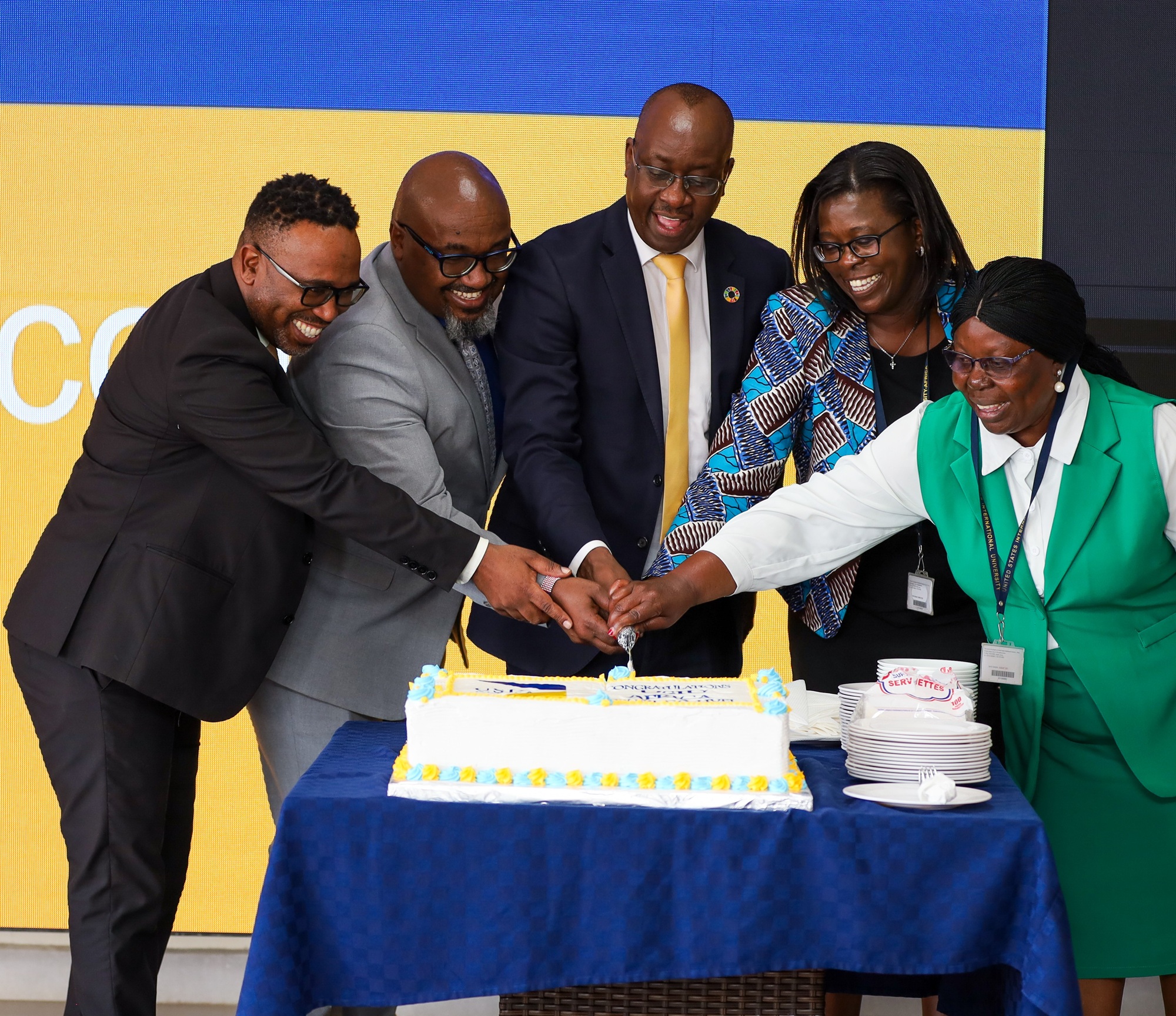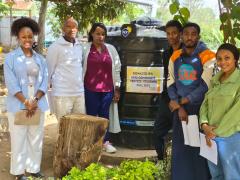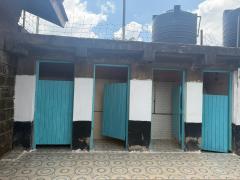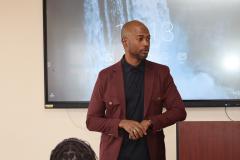SPEECH BY THE VICE CHANCELLOR, PROF PAUL ZELEZA, DURING THE 41ST COMMENCEMENT CEREMONY OF THE UNITED STATES INTERNATIONAL UNIVERSITY-AFRICA HELD ON SEPTEMBER 28, 2019
The Chief Guest, Mr. Vimal Shah
Board of Trustees
The Chancellor, Dr. Manu Chandaria
University Council
University Senate
Management Board
Faculty, students, staff and alumni present
Parents and guardians,
Distinguished Ladies and Gentlemen
It is my pleasure this morning to welcome you all to the 41st Commencement ceremony honoring the achievements of our graduands, in the year of our golden anniversary. I want to extend my congratulations to the 1337 students graduating today.
I pay special tribute to the members of staff and faculty who have prepared our students during their stay here. I also thank the parents, sponsors and guardians for the sacrifices they have made over the years to educate their children.
I also wish to congratulate members of staff who are graduating at this ceremony and those who have recently completed their study programs at other institutions locally and elsewhere. You made the right choice to advance your careers. We know that the knowledge and skills that you have acquired will improve your service delivery for the betterment of this institution.
The qualifications you are about to receive today are a source of pride to us as USIU-Africa, as they represent the continuation of the legacy of academic excellence, which we have upheld over the past 50 years. I am confident that as you go out into the world, USIU-Africa has empowered you with superior skills and the requisite mindset that you will need to deal with all the challenges that will come your way.
Each of the commencement ceremonies we have had have been special, because they are a celebration of the achievements of our students. This year’s commencement stands out because it is the hallmark of our celebration of our 50th anniversary. You are the representation of everything we are proud of as an institution, and your presence here today bolsters our confidence in our extraordinary journey as the future unfolds.
It is my sincere hope that you will continue in the path of our theme this year- A legacy of academic excellence- in all spheres of your life that you will continue to put your knowledge and skills towards the achievement of excellence, which is what we are gathered to celebrate here today.
As we look at the last fifty years, I would like to recognize and appreciate the visionaries who led this institution and worked extremely hard to ensure that USIU-Africa get to the place that it is today. Today we fondly remember Dr. William C. Rust who was the first president of California Western University in the US. We cannot forget the generous contribution of Dr. Lilian Beam who purchased 20 acres of property in Kasarani, Nairobi where the campus moved to in 1991. In 1994, Professor Freida Brown assumed the position of the first Vice-Chancellor following the award of its Charter from the Kenyan Government, succeeded Dr. Beam as Executive Director and served USIU-Africa for a total of 21 years.
USIU-Africa @50: A legacy of academic excellence
John Masefield, the British Poet Laureate, once said that
There are few things more enduring than a university.
Religions may split into sect or heresy;
dynasties may perish or be supplanted,
but for century after century the university will continue,
and the stream of life will pass through it,
and the thinker and the seeker will be bound together
in the undying cause of bringing thought into the world.
To be a member of these great societies
must ever be a glad distinction.
USIU-Africa’s existence over the past 50 years has been consistent with Masefield’s words. From its humble beginnings in 1969, USIU-Africa has grown into a renowned private secular university in Kenya, East Africa, and the continent. It opened its doors with 5 students; enrolment did not reach the 500 mark until 1995. At the end of last academic year, enrolment reached 8,383 students who hailed from all the 47 counties in Kenya and 73 countries.
No less remarkable has been the growth of academic programs. In 1977 the university began to offer fully accredited degree programs in Business Administration, Psychology and International Relations. The number of academic programs expanded from 4 in 1990 to 10 in 2000 and 16 in 2010 and currently offering 28 fully accredited programs. Currently, nine programs are under review by our accreditors. They include cutting edge programs in STEM and the Health Sciences designed to respond to the trends and demands of the 21st century and the digitalized economy and society. Among them are BSc in Data Science, BSc in Software Engineering, MSc in Information Security, and Ph.D., in Information Systems and Technology, which was approved by WSCUC two weeks ago. We also be entering the online space with the establishment of an MBA Online.
As a university we take pride in ensuring access, affordability, and accountability in our academic programs, in providing an excellent education that takes our students places. Through our own resources and partnerships with various donors, we have a financial aid budget of KES 102 million that supports our students. And there is the remarkable student led initiative, Educate Your Own, that currently supports 41 students through scholarships. These achievements continue to be our greatest strength and are a clear indication of the legacy of academic excellence over the last fifty years.
But we are in an era where higher education in Kenya and Africa is facing several challenges, including but not limited to institutional supply, resources, faculty, research, outputs, and leadership. Over the years, these challenges and their solutions have forced us to consider the form in which we may continue to exist and excel. We are increasingly being called upon to offer quality programs to our students and continually innovate in order to overcome these challenges.
Please allow me to briefly elaborate these challenges and how we as a university are trying to deal with them. The first is institutional supply. Despite the rapid growth of higher education institutions and enrollments, Africa still has the world’s lowest share of universities (8.9%) and enrollments (13% compared to the world average of 38%). As noted earlier, enrolments at USIU-Africa have grown but we seek to expand in a responsible manner, matching enrolment growth with provision of adequate faculty and facilities to ensure high quality education.
Second, there are resource challenges evident in insufficient and declining public funding, severe deficits of physical and electronic resources, poor maintenance of existing infrastructures, and they suffer from excessive tuition dependence and limited diversification of resources.
As a university we are working hard to diversify our revenue sources through grants and contracts, research, and fundraising. For example, from 2016-2018 our external research grants doubled from KES 54.4 million to KES 107.4 million. Last academic year we secured KES 118.5 million in new external grants.
Third, many countries and higher education institutions suffer from shortages of qualified faculty and insufficient teaching and learning facilities. Academic salaries are generally lower than other professions, making academic careers less attractive to the best and brightest, which further reduces the faculty pipeline. In Kenya, for example, only 34% of the faculty in the country’s 74 universities have PhD degrees, and many are poorly trained, a problem exacerbated by rising academic fraud including contract cheating for dissertations and predatory journal publications.
At USIU-Africa 73% of our faculty have doctoral degrees. Our student faculty ratios are relatively low. While they are nearly 70:1 in public universities, ours is 1:31, and we intend to lower it still through our program of hiring 21 new faculty every year. The quality of education is fundamentally about the quality of student-faculty engagement.
Fourth, many universities suffer from poor institutional governance, which is engendered by politicized leadership appointments and political meddling, lack of leadership development opportunities, prevalence of cultures of institutional authoritarianism and corruption, and excessive interventions by often understaffed regulatory agencies.
We can all be proud of the high levels of integrity that has characterized the university’s leadership since inception. All the beautiful infrastructure you see on this campus has been built with internal savings. Incidentally, our tuition is no different from other Kenyan universities. And we provide numerous skills and leadership development opportunities for our employees and managers. Last January we established the Institute for Higher Education Research and Leadership Development to train higher education leaders in the region.
Fifth, African universities suffer from unequal internationalization. The continent is not a major player in the lucrative international student market; more African students study abroad than foreign students study in Africa. There is also the age-old problem of intellectual dependence and epistemic extraversion rooted in the histories of colonial and neo-colonial dependence. Much of African scholarship imports and follows, sometimes blindly, analytical paradigms, perspectives, and preoccupations of scholarship in North America and Western Europe.
At USIU-Africa we are proud of the fact that nearly 15% of our students are international, and we also recruit international staff and faculty. And we have dozens of exchange programs and partnerships with other universities around the world as well as corporates, international and intergovernmental agencies such as the African Development Bank and the World Bank.
Finally, these challenges have a far-reaching impact on the quality of education. This is evident in the two crucial products, namely, the quality of graduates and research. Numerous reports indicate that university graduates suffer from high levels of unemployment and underemployment, sometimes higher than for primary and secondary graduates. As for research, Africa accounts for the lowest levels of world researchers and scientific publications (less than 3%), and the lowest levels of gross domestic expenditure on research and development (0.5% compared to the world average of 1.7%).
At USIU-Africa we’re committed to providing our students with employability skills in the classroom and the development of soft skills so highly prized by employers, and through community service and internships. As a university we have also increased our internal research support, from KES 3.5 million in 2016 to KES 12 million.
As we continually face these challenges, we are equally optimistic of the future. In the pursuit of academic, operational and service excellence, we have continued implementing the strategic priorities laid out in our current Strategic Plan in terms of expanding our academic programs and research productivity, revenues and fundraising, physical and electronic facilities, human resources and employee performance, external partnerships and linkages with the private sector, public sector agencies, community organizations, and international and intergovernmental organizations.
Our intentional focus on personalized teaching and learning materials, quality faculty and state of the art learning facilities have delivered more than 19,300 all-rounded and achieving graduates. As we move forward we are now focusing on raising these standards even higher by:
We are proud of our achievements in the past 50 years, and it is our sincere hope that we will surpass these achievements over the course of the next 50 years. In 50 years, USIU- Africa hopes to have been at the forefront of the achievement of one of the African Union’s goals, namely: “ “[To] build and expand an African knowledge society through transformation and investments in universities, science, technology, research and innovation; and through the harmonization of education standards and mutual recognition of academic and professional qualifications [as well as] establish an African Accreditation Agency to develop and monitor educational quality standards across the continent.”
I want to remind our students as I have always done every year that we want their years at USIU-Africa to be great years, but not the best years of their lives. Instead, we want their years here to be a time where they harness the powers of higher education to build strong foundations for their lives here on out, so that each year after this will be better than the preceding ones.
On our end, we will also strive to ensure that our chapter in USIU-Africa’s illustrious history is one that will be remembered for years to come. Our long term goal, however, is to ensure that we position USIU-Africa even better, so as to ensure that even better years are within its grasp.
Congratulations USIU-Africa Class of 2019!






